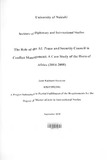| dc.description.abstract | This dissertation contends that despite the increasing complexity of conflict dynamics in the African continent, the African Union established a home grown initiative to deal with the brunt of conflicts in the region. The Peace and Security Council was put in place in 2004 to carry out activities using these approaches. The Hom of Africa, one of the hottest beds of conflict in Africa, immediately attracted the attention of the Peace and Security Council which conducted peace processes in various countries therein. Such peace processes have been completed in three of these countries, including Kenya, Somalia and Sudan. The main question that arises therefore is whether these home grown approaches to conflict are yielding results.
The main objective of this research is to evaluate the contribution of the African Union Peace and Security Council in conflict management in the Hom of Africa by reviewing the decisions and activities of the African Union Peace and Security Council regarding the conflicts in the three countries: Kenya, Somalia and Sudan. Mainly secondary data was used to analyze the issues in question. The research relied on the communiques of the AU PSC between the periods of 2004 and 2008. The Conflict Research theory of conflict management was used as a guide to analyze the role of the African Union Peace and Security Council in conflict management in the Hom of Africa.
The study observed that the Peace and Security Council initiates any peace operations by analyzing a potential or existing crisis situation, which if necessary is followed by the deployment of fact-finding missions to the trouble spots. The Council then makes a decision or recommendation to authorize and legitimize the African Unions intervention in internal crisis situations. The Peace and Security Council helps countries tom by conflict to create conditions for sustainable peace through peacekeeping and peace enforcement which facilitate the observation of peace processes in post-conflict areas and assisting excombatants in implementing the peace agreements they may have signed among others.
The dissertation notes that despite the emerging issues that the African Union Peace and Security Council has faced, its foray into peacekeeping in Sudan and Somalia suggests that the continental body will be called upon in the future to stabilize countries that are afflicted by the scourge of violent conflict. In addition, the study deduced that the African Union Peace and Security Council seeks to find political solutions to conflict in Africa through mediating in conflicts. It also provides the favorable environment for negotiations between conflicting parties to take place. In conclusion, the study revealed that the African Union Peace and Security Council has played key roles in managing conflicts in Kenya, Sudan and Somalia despite the emerging issues it has had to face. In addition, there was an observation that the Peace and Security Council can be relied on for future interventions in conflict prone countries. | en_US |

